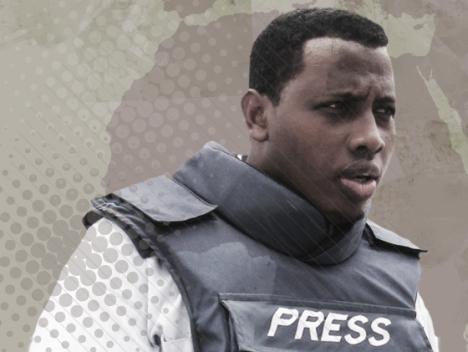When It’s Not the Right Time… Or the Right Place
by IFEX / March 25, 2014 / No comments
“Anytime, anywhere, I could be shot dead.” –Mustafa Haji Abdinur, Somali journalist.

Mustafa Haji Abdinur works as correspondent for Agence-France-Presse in Mogadishu and is founder and editor-in-chief of the independent station Radio Simba. Photo: IFEX
Mustafa Haji Abdinur works as correspondent for Agence-France-Presse in Mogadishu and is founder and editor-in-chief of the independent station Radio Simba. He spoke with IFEX about why he feels like a “dead man walking,” and what he thinks can be done to tackle impunity in his country.
Mustafa has faced many threats while doing his work in the past years. His work for AFP and other Western media outlets has made him a target of both insurgents and government authorities. After his family received personal threats, his wife and his three children have been relocated outside of Mogadishu. Mustafa now sees them once every three or four months.
Even though he knows that every day he is at risk of being threatened, intimidated, or even killed, he keeps covering sensitive issues and denouncing human rights abuses in his country. In 2009, he was granted CPJ’s International Press Freedom Award for his courage in defending press freedom in Somalia.
IFEX reached Mustafa in Mogadishu, and interviewed him on his experience of being a journalist and on the context of impunity in Somalia.
Mustafa, you are one of those journalists who always work hard to denounce violence and promote peace journalism through your reports. With all of these risks that you face, where do you find the will and the motivation to continue doing this type of work?
It’s some sort of commitment. I like being a journalist. I find it very interesting. Many people encourage me saying what I do is exactly what has got to be done, but still they tell me that it’s not the right time and it’s not the right place when you know that people who are doing this profession are being killed.
Are there certain topics that are most dangerous to cover or denounce as a journalist?
When we want to talk about people who are being killed without justice, when we want to talk about people who are being arrested. Those topics are very sensitive.
During your appearance at the UN discussion on the protection of civilians in armed conflict earlier this year, you referred to yourself as a dead-man walking. Can you explain why you describe yourself in this way?
Anytime, anywhere, I could be shot dead. Many people ask me: “Hey are you still alive? Take care.” This is what people say when they see me in the street.
Almost all of the journalists killed since 2007 were male professionals. Can you tell me how do women play a role in defending the right to free expression, and do they face different forms of threats?
It’s quite different. They could be raped, harassed, violated. My view is that female journalists have the opportunity to know what the people are thinking about violations against human rights, in comparison to male journalists, because they can talk to women that have been raped, they can talk to women who have been victimised. This is where the role of female journalists is also important.
In your opinion, what does the culture of impunity look like in Somalia?
Can you imagine there is no proper justice system that has been set so far for the sake of the lives that have been taken illegally? The culture here of doing crimes and walking free is very normal, it is very common. The justice system is completely non-existent.
Why is the International Day to End Impunity important to you, and do you believe that people who take action throughout the world can play a role in helping to end impunity?
That’s what I believe, that’s why I went to the UN. As long as we have some people who are talking about this issue throughout the world and indicating that there is a problem. This problem needs to be solved. It could be solved as long as people are dedicating their perspective through the world. If we keep silent, and people don’t take it seriously, those who committed crimes and are able to walk free, still have the eligibility to do the same (recommit crimes).
A special thank you to National Union of Somali Journalists (NUSOJ) and Simba Media Centre for contributing to this action.
This article was originally published by IFEX on February 25, 2014.




